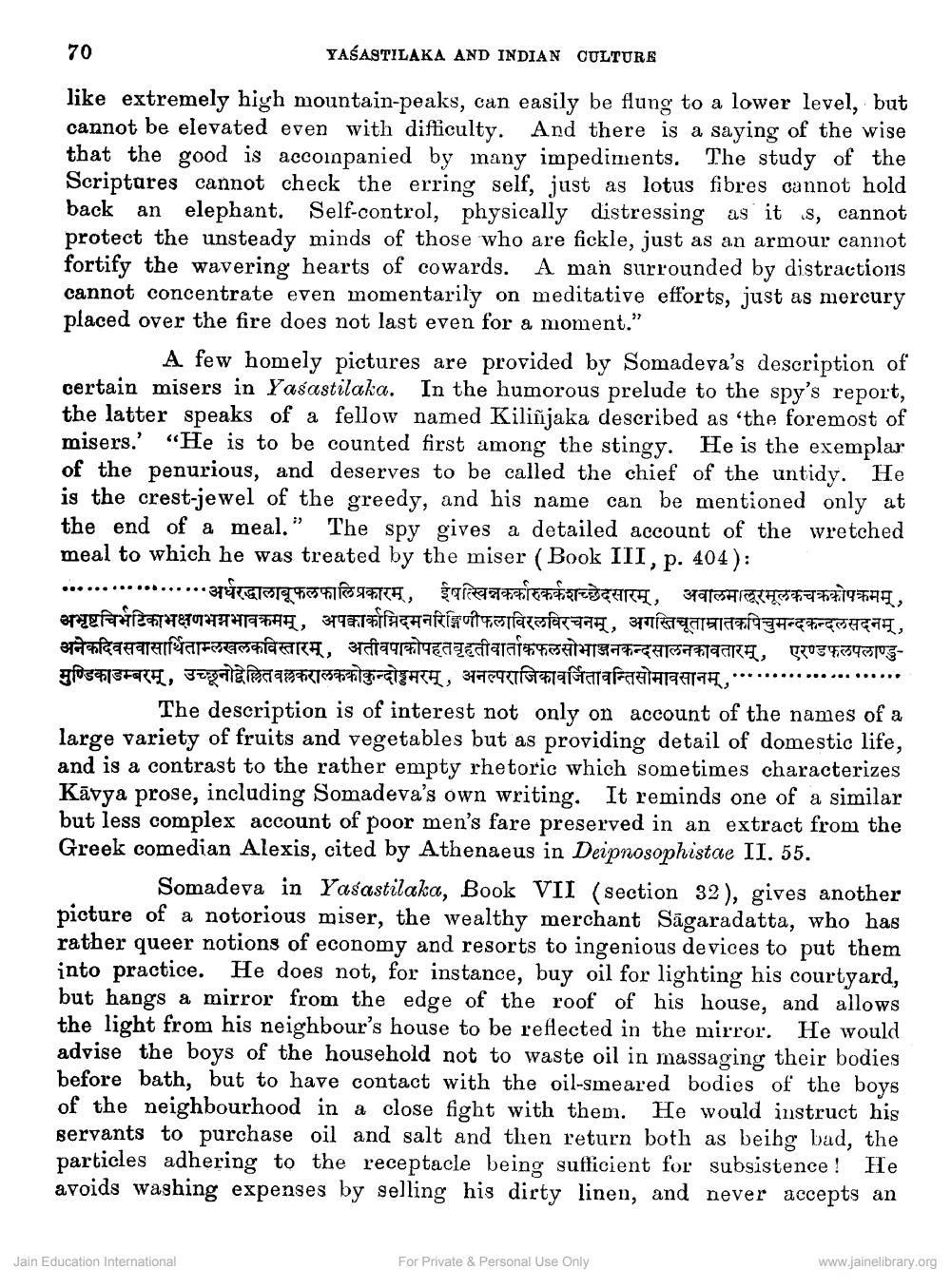________________
70
YAŚASTILAKA AND INDIAN CULTURE
b e mentioned
he spy gives a deto
al to which he was t
like extremely high mountain-peaks, can easily be flung to a lower level, but cannot be elevated even with difficulty. And there is a saying of the wise that the good is accoinpanied by many impediments. The study of the Scriptures cannot check the erring self, just as lotus fibres cannot hold back an elephant. Self-control, physically distressing as it s, cannot protect the unsteady minds of those who are fickle, just as an armour cannot fortify the wavering hearts of cowards. A man surrounded by distractions cannot concentrate even momentarily on meditative efforts, just as mercury placed over the fire does not last even for a moment."
A few homely pictures are provided by Somadeva's description of certain misers in Yasastilaka. In the humorous prelude to the spy's report, the latter speaks of a fellow named Kiliñjaka described as the foremost of misers. “He is to be counted first among the stingy. He is the exemplar of the penurious, and deserves to be called the chief of the untidy. He is the crest-jewel of the greedy, and his name can be mentioned only at the end of a meal." The spy gives a detailed account of the wretched meal to which he was treated by the miser (Book III, p. 404): ................... gl/T4541 91TH, e ferTARH, 3771 ARHFP#19219, अभृष्टचिर्भटिकाभक्षणभग्नभावक्रमम् , अपक्वार्काग्निदमनरिङ्गिणीफलाविरलविरचनम् , अगस्तिचूताम्रातकपिचुमन्दकन्दलसदनम् , अनेकदिवसवासार्थिताम्लखलकविस्तारम् , अतीवपाकोपहतबृहतीवार्ताकफलसोभाजनकन्दसालनकावतारम् , एरण्डफलपलाण्डुमुण्डिकाडम्बरम् , उच्छूनोद्वेल्लितवल्लकरालककोकुन्दोड्डमरम् , अनल्पराजिकावर्जितावन्तिसोमावसानम् ,............
The description is of interest not only on account of the names of a large variety of fruits and vegetables but as providing detail of domestic life, and is a contrast to the rather empty rhetoric which sometimes characterizes Kāvya prose, including Somadeva's own writing. It reminds one of a similar but less complex account of poor men's fare preserved in an extract from the Greek comedian Alexis, cited by Athenaeus in Deipnosophistae II. 55.
Somadeva in Yasastilaka, Book VII (section 32), gives another picture of a notorious miser, the wealthy merchant Sagaradatta, who has rather queer notions of economy and resorts to ingenious devices to put them into practice. He does not, for instance, buy oil for lighting his courtyard, but hangs a mirror from the edge of the roof of his house, and allows the light from his neighbour's house to be reflected in the mirror. He would advise the boys of the household not to waste oil in massaging their bodies before bath, but to have contact with the oil-smeared bodies of the boys of the neighbourhood in a close fight with them. He would instruct his servants to purchase oil and salt and then return both as being bad, the particles adhering to the receptacle being sufficient for subsistence! He avoids washing expenses by selling his dirty linen, and never accepts an
Jain Education International
For Private & Personal Use Only
www.jainelibrary.org




